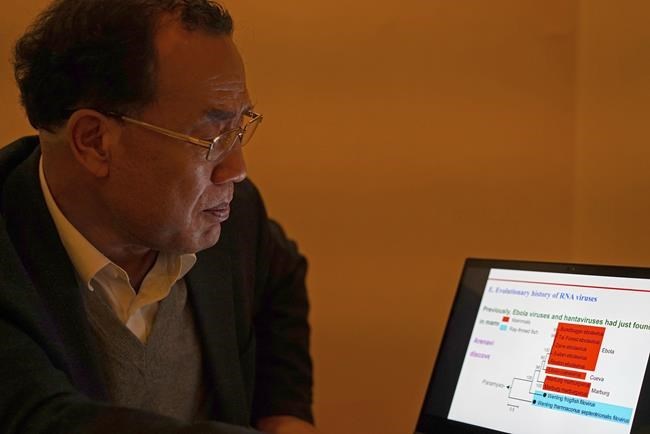SHANGHAI (AP) — The first scientist to publish a sequence of the COVID-19 virus in China staged a sit-in protest outside his lab after authorities locked him out of the facility — a sign of Beijing's continuing conducting research on the coronavirus.
Zhang Yongzhen wrote in an online post Monday that he and his team had been suddenly notified they were being evicted from their lab, the latest in a series of setbacks, demotions and ousters since the virologist published the sequence in January 2020 without state approval.
When Zhang tried to go to the lab over the weekend, guards barred him from entering. In protest, he sat outside on flattened cardboard in drizzling rain, pictures from the scene posted online show. News of the protest spread widely on Chinese social media and Zhang told a colleague he slept outside the lab — but it was not clear Tuesday if he remained there.
“I won’t leave, I won’t quit, I am pursuing science and the truth!” he wrote in a post on Chinese social media platform Weibo that was later deleted.
In an online statement, the Shanghai Public Health Clinical Center said that Zhang’s lab was being renovated and was closed for “safety reasons.” It added that it had provided Zhang’s team an alternative laboratory space.
But Zhang wrote online that his team wasn’t offered an alternative until after they were notified of their eviction, and that the lab offered didn’t meet safety standards for conducting their research, leaving his team in limbo.
Zhang’s latest difficulty reflects how China has sought to control information related to the virus: An Associated Press investigation found that the meaningful domestic and international efforts to trace it from the first weeks of the outbreak. That pattern continues to this day, with labs closed, collaborations shattered, foreign scientists forced out and Chinese researchers barred from leaving the country.
When reached by phone on Tuesday, Zhang said it was “inconvenient” for him to speak, saying there were other people listening in. In an email Monday to collaborator Edward Holmes seen by AP, Zhang confirmed he was sleeping outside his lab after guards barred him from entering.
An AP reporter was blocked by a guard at an entrance to the compound housing Zhang’s lab. A staff member at the National Health Commission, China’s top health authority, said by phone that it was not the main department in charge and referred questions to the Shanghai government. The Shanghai government did not immediately respond to a request for comment.
Zhang’s ordeal started when he and his team decoded the virus on Jan. 5, 2020, and wrote an internal notice warning Chinese authorities of its potential to spread — but did not make the sequence public. The next day, Zhang’s lab was ordered temporarily shut by China’s top health official, and Zhang came under pressure by Chinese authorities.
Around the time, China had were being treated for a respiratory illness in the central city of Wuhan. Possible cases of the same illness had been reported in Hong Kong, South Korea and Taiwan involving recent travelers to the city.
Foreign scientists soon learned that Zhang and other Chinese scientists had deciphered the virus and called on China to release the sequence. Zhang published it on Jan. 11, 2020, despite a .
Sequencing a virus is key to the development of test kits, disease control measures and vaccinations. The virus eventually spread to every corner of the world, triggering a pandemic that disrupted lives and commerce, prompted widespread lockdowns and killed millions of people.
Zhang was later awarded prizes in recognition for his work.
But Zhang’s publication of the sequence also prompted additional scrutiny of his lab, according to Holmes, Zhang’s collaborator and a virologist at the University of Sydney. Zhang was removed from a post at the Chinese Center for Disease Control and Prevention and barred from collaborating with some of his former partners, crippling his research.
“Ever since he defied the authorities by releasing the genome sequence of the virus that causes COVID-19 there has been a campaign against him,” Holmes said. “He’s been broken by this process and I’m amazed he has been able to work at all.”
Dake Kang, The Associated Press




